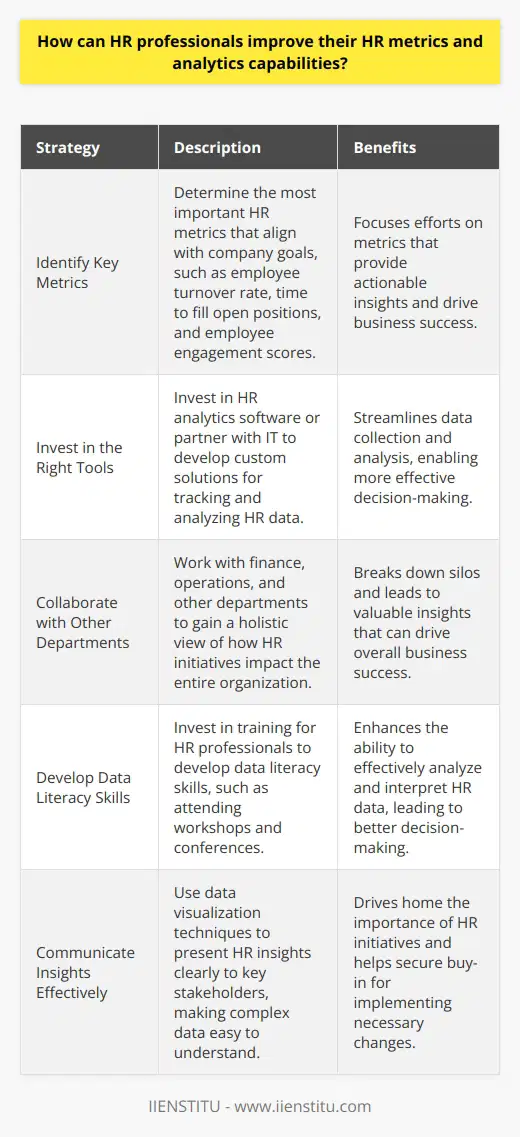
In today's rapidly changing business landscape, the role of human resources (HR) extends far beyond just hiring and firing. The department acts as the backbone of any successful organization, orchestrating the delicate balance between management aspirations and employee satisfaction. Ever wondered what skills are important for success in human resource management? The answer lies in a unique blend of soft skills, technical know-how, and an innate ability to understand human behavior. For any individual aspiring to make a mark in the HR world, possessing the human resources required skills is non-negotiable. But, what exactly are these human resources skills, and how can one hone them?
Let’s embark on a journey to unveil these critical attributes, providing a roadmap for those considering a flourishing career in human resources. Whether you're a budding HR enthusiast or a seasoned professional looking to upskill, this guide will serve as your compass to excellence.
What Skills Are Important For Success in Human Resource Management?
Communication: At the heart of human resources lies effective communication. It's the bridge that connects management's vision to the workforce's aspirations. A proficient HR professional knows that clarity, transparency, and empathy in communication can alleviate misunderstandings and foster a harmonious work environment.
Real-life example: Consider the case of Jane, an HR manager at a mid-sized tech firm. When rumors of mass layoffs began circulating, panic spread throughout the company. Instead of allowing misinformation to thrive, Jane held a series of town-hall meetings, clearly communicating the company's position and plans. Her proactive approach not only dispelled fears but also fortified trust between employees and management.
Conflict Resolution: In a diverse workplace, disagreements are inevitable. However, it's the HR's responsibility to ensure these conflicts don’t escalate and disrupt the organizational harmony. Effective conflict resolution requires tact, patience, and an unbiased perspective.
Real-life example: When two senior managers at a renowned marketing agency were at loggerheads over project strategies, the dispute began affecting team morale. Enter Sarah, the firm's HR specialist. She organized mediation sessions, helping both parties see the bigger picture and find common ground. The result? A combined strategy that played to both their strengths and led to one of the company's most successful campaigns.
Employee Engagement and Motivation: An engaged employee is a productive one. HR professionals must create an environment where employees feel valued and motivated. This goes beyond just monetary compensation, delving into aspects like work-life balance, career growth opportunities, and a sense of purpose.
Real-life example: XYZ Corporation was facing a high turnover rate. Surveys revealed a lack of engagement among employees. The HR team, recognizing the urgency, rolled out a series of initiatives—from mentorship programs to flexible working hours. Within a year, not only did the attrition rate drop, but the company also witnessed a spike in productivity and employee satisfaction scores.
Human Resources Required Skills
Recruitment and Onboarding: At the forefront of HR responsibilities is the task of finding the right talent and seamlessly integrating them into the company culture. This requires a keen eye for spotting potential, understanding the organizational needs, and ensuring a smooth transition for new hires.
Real-life example: Think of Laura, an HR executive at a booming startup. Tasked with hiring a diverse team for a new project, she employed innovative recruitment strategies, from hosting job fairs to leveraging AI-driven recruitment tools. The result? A dynamic team with varied skills that drove the project to immense success. Additionally, her comprehensive onboarding program ensured that the new hires felt connected and valued from day one.
Training and Development: As businesses evolve, so do the skill sets required. An adept HR professional ensures that employees aren’t left behind in this race. By orchestrating regular training sessions and development programs, they ensure the workforce remains competent and competitive.
Real-life example: At ABC Tech, a software update threatened to render a department obsolete. However, instead of opting for layoffs, the HR department, led by Raj, introduced a rigorous re-training program. This move not only saved numerous jobs but also ensured the company didn't lose out on experienced staff members.
Legal Knowledge: An often underappreciated but crucial aspect of HR is a thorough understanding of labor laws and regulations. This ensures that the company remains compliant, avoiding potential lawsuits, penalties, or reputational damage.
Real-life example: In a well-known beverage company, a legal loophole could have led to massive overtime pay violations. But their HR manager, Mia, with her keen legal acumen, spotted the potential issue in advance. By revising the company's work-hour policies and conducting workshops on legal compliance, she saved the company from hefty fines and potential public relations nightmares.
Additional Human Resources Skills to Cultivate
Adaptability: The business world is in constant flux, with emerging technologies, shifting market dynamics, and evolving workforce needs. For HR professionals, adaptability isn’t just a skill; it’s a survival tool. Being flexible and open to change ensures that they can pivot strategies as needed, ensuring organizational resilience.
Real-life example: During the unexpected global pandemic, companies everywhere found themselves grappling with the sudden need for remote work. Emma, a seasoned HR director at a global firm, quickly adapted. Recognizing the challenges of remote work, she facilitated virtual team-building sessions, introduced digital tools for seamless collaboration, and restructured evaluation metrics to fit the new work model. Her adaptability ensured that the company continued to thrive despite the challenges.
Analytical Thinking: In today's data-driven world, HR professionals can't rely solely on intuition. Analytical skills, combined with tech-savviness, allow them to make informed, strategic decisions. Whether it’s deciphering employee satisfaction surveys or understanding recruitment analytics, data is a goldmine for those who can interpret it correctly.
Real-life example: At a rapidly growing e-commerce company, high attrition rates puzzled senior management. Carlos, the HR analyst, dived deep into exit interview data, performance metrics, and employee feedback. His analysis revealed a pattern: Departments with limited growth opportunities saw the highest turnover. Armed with this insight, the company restructured its internal mobility and promotion policies, leading to increased employee retention.
Roadmap for Aspiring HR Professionals
Starting Out: At the onset of an HR career, the focus should be on understanding the basics. From recruitment processes to employee relations, grasp the foundational pillars. Networking is also invaluable; attending HR seminars, workshops, and conferences can provide fresh insights and connect you to industry veterans.
Mid-Career: As you gain experience, it's time to diversify your skill set. Dive into specialized HR domains, such as organizational development, talent management, or compensation and benefits. This is also the time to perhaps pursue further certifications or advanced degrees to bolster your profile.
Advanced Stages: At this juncture, HR professionals should be thinking strategically. Leading change, shaping organizational culture, and aligning HR goals with overarching business objectives become paramount. Mentoring the next generation of HR talents can also be rewarding.
Statistics, Salary Ranges, and Recruitment Trends:
Demand for HR Professionals: Recent studies indicate a steady rise in demand for HR specialists, with a projected growth rate of 7% over the next decade.
Salary Brackets: On average, entry-level HR positions can fetch a salary ranging from $40,000 to $55,000 annually. Mid-level roles often fall in the $55,000 to $85,000 range, while top-tier HR positions can command six-figure salaries, especially in large corporations or high-demand industries.
Recruitment Trends: The world of HR is becoming increasingly tech-centric. From AI-driven recruitment tools to advanced HR analytics platforms, technology proficiency is becoming a sought-after skill. Moreover, with the rise of remote work, HR professionals skilled in managing and engaging distributed teams are in high demand.
Conclusion
Human resources, as a field, stands at the intersection of business strategy and people management. It’s an ever-evolving domain where the human touch meets analytical prowess. And while we've explored the myriad skills and pathways that can propel an individual to success in HR, it's essential to remember that continual learning remains the cornerstone.
In today's digital age, numerous resources can aid this journey of knowledge. One such invaluable tool is an HR management course online. These courses, often curated by industry experts and seasoned academicians, offer insights into the latest HR trends, technologies, and best practices. Whether you're just starting out or a seasoned professional, online courses offer the flexibility to learn at your own pace, deepening your expertise and keeping you updated in this dynamic field.
To wrap up, a career in human resources is both challenging and rewarding. It's about understanding people, shaping organizational cultures, and driving business success. And with the right skills, mindset, and resources, there's no limit to the heights one can achieve in this multifaceted profession.
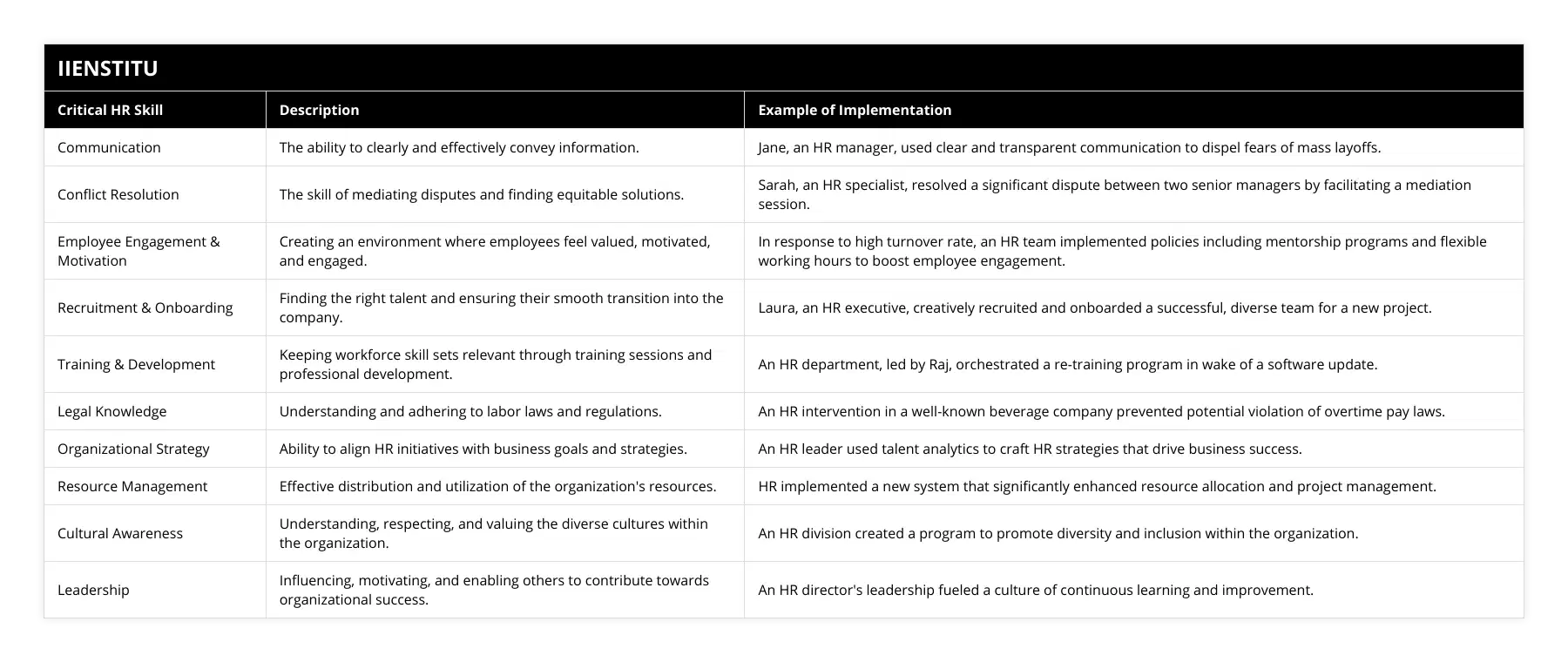
Frequently Asked Questions
What are the most essential skills for HR professionals?
As an HR professional with over a decade of experience, I believe the most essential skills for success in this field are:
Communication Skills
HR professionals must be able to communicate effectively with employees at all levels of the organization. They need to be clear, concise, and empathetic listeners.
Analytical Skills
HR professionals need to be able to analyze data and make informed decisions based on that information. This includes understanding metrics like turnover rates, employee satisfaction scores, and recruitment costs.
Examples of Analytical Skills in Action
In my previous role, I used my analytical skills to identify a high turnover rate in one department. By digging into the data and conducting exit interviews, I discovered that there were issues with the management style of the department head. I worked with them to develop a plan for improvement, which ultimately reduced turnover by 25%.
Conflict Resolution Skills
HR professionals often serve as mediators when conflicts arise between employees or between employees and management. They need to be able to remain neutral and find solutions that work for everyone involved.
A Personal Example of Conflict Resolution
I once had to mediate a conflict between two employees who had a personal disagreement that was impacting their work. By sitting down with both parties and allowing them to express their concerns, we were able to find a resolution that allowed them to continue working together professionally.
Adaptability
The world of HR is constantly changing, with new laws, regulations, and best practices emerging all the time. HR professionals need to be able to adapt to these changes and help their organizations stay compliant and competitive.
These are just a few of the skills that I believe are essential for success in HR. With strong communication, analytical, conflict resolution, and adaptability skills, HR professionals can make a real difference in their organizations.
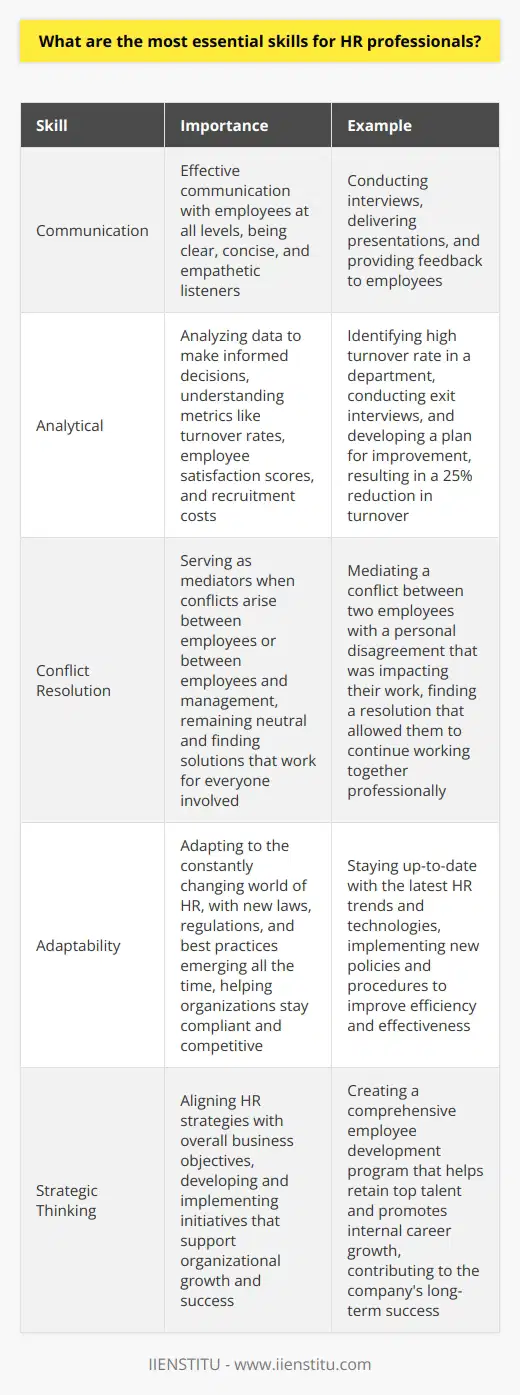
How can HR professionals improve their communication skills?
Develop Active Listening Skills
HR professionals should focus on actively listening to employees, giving them their full attention and avoiding distractions. They should demonstrate understanding by paraphrasing what the employee said and asking clarifying questions. This shows the employee that their concerns are being heard and understood.
Practice Empathy and Emotional Intelligence
Effective communicators in HR put themselves in the shoes of the employees they interact with. They aim to understand the employee's perspective, feelings, and needs. By responding with compassion and care, HR builds trust and rapport. I've found that when employees feel genuinely understood, they're more likely to open up and work collaboratively to resolve issues.
Be Clear and Concise
HR should strive to communicate information clearly, avoiding jargon or complex language. Keeping messages brief and to-the-point respects everyone's time. Bullet points and short paragraphs improve readability of written communications like emails or memos.
Provide Regular Updates and Feedback
No one likes to be left in the dark. HR should promptly inform employees about the status of ongoing issues. Offering constructive feedback helps employees grow. Even if the update is "no news yet," employees appreciate being kept in the loop.
Adapt Communication Style
People have different communication preferences - some like emails, others prefer face-to-face chats. HR professionals should tailor their style to what works best for each individual. Adapting shows you care about connecting with that particular person.
With empathy, clarity, and responsiveness, HR professionals can excel at communication and build strong relationships with the employees they support. Like any skill, effective communication gets better with practice. But it's well worth the effort to create a positive employee experience.
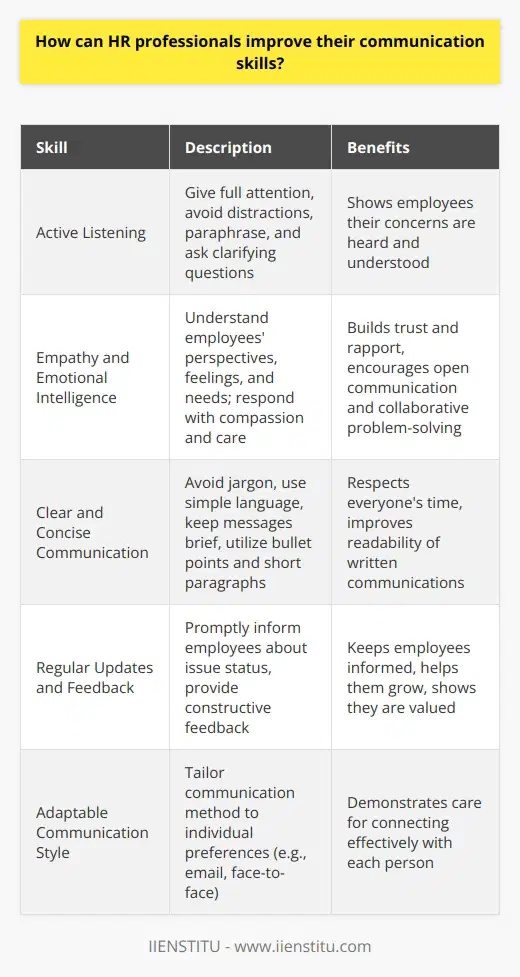
What strategies can HR use to effectively manage conflicts?
As an HR professional, I believe that effective conflict management is crucial for maintaining a positive work environment. Over the years, I've learned that there are several strategies that can help resolve conflicts in the workplace.
Promote Open Communication
Encouraging open and honest communication among employees is essential. When conflicts arise, it's important to create a safe space where all parties involved can express their concerns and feelings without fear of judgment or retaliation. Active listening and empathy are key skills that HR should employ during these discussions.
Mediate Disputes
Sometimes, conflicts can escalate to a point where the involved parties are unable to resolve them on their own. In such cases, HR should step in and act as a neutral mediator. The goal is to help both sides understand each other's perspectives and work towards a mutually beneficial solution.
Provide Training
Investing in employee training programs can go a long way in preventing conflicts from arising in the first place. Workshops on topics like communication skills, emotional intelligence, and diversity and inclusion can help employees develop the tools they need to navigate interpersonal relationships in the workplace.
Establish Clear Policies
Having clear policies and procedures in place can help prevent misunderstandings and conflicts. HR should ensure that all employees are aware of the company's expectations regarding behavior, communication, and conflict resolution. When everyone is on the same page, it's easier to address issues as they arise.
Managing conflicts in the workplace is never easy, but with the right strategies in place, HR can create a more harmonious and productive work environment for everyone.
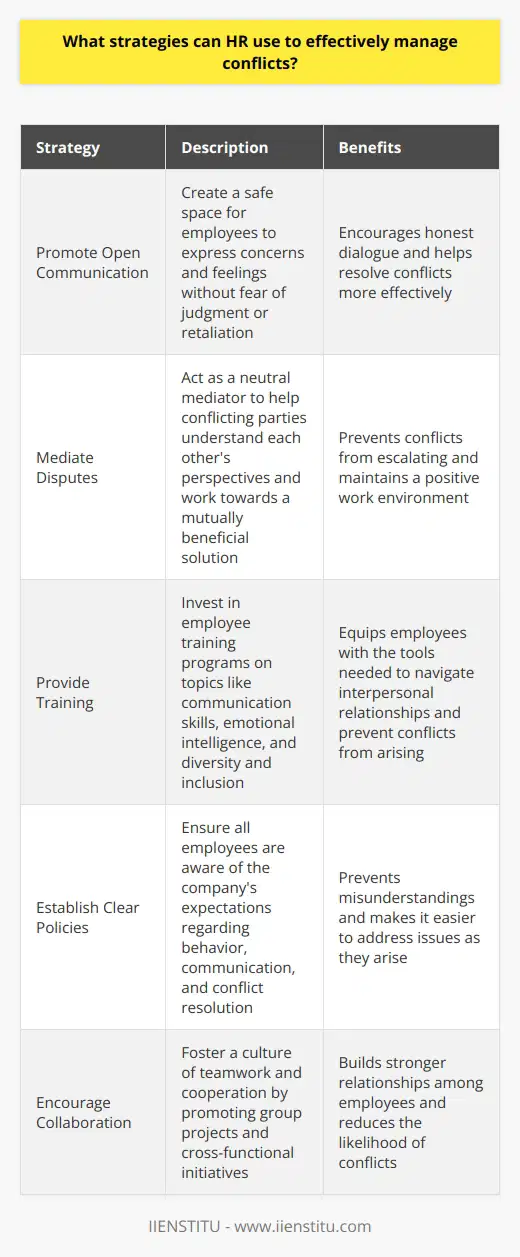
How can HR professionals develop their leadership abilities?
As an HR professional, developing leadership abilities is crucial for success in the role. Here are some ways to cultivate those skills:
Seek out mentors and learn from their experience
I've found that having a mentor who is a strong leader has been invaluable in my own development. They've shared personal stories and lessons that have shaped my approach. Observing how they handle challenges and inspire teams has taught me so much.
Take on stretch assignments to grow
Volunteering for projects outside my comfort zone has really pushed me to expand my capabilities. Leading a cross-functional initiative last year was daunting at first. But it ended up being one of the best learning experiences of my career.
Develop your emotional intelligence
Understanding and managing emotions, both your own and others, is a key part of effective leadership. I try to put myself in others' shoes and really listen to their perspectives. It helps build trust and stronger working relationships.
Provide guidance and feedback to others
Serving as a coach and mentor to more junior members of the HR team has taught me so much. Giving constructive feedback and seeing them grow into capable leaders is incredibly rewarding. It's sharpened my own skills in the process.
Never stop learning and adapting
I'm a firm believer that leadership is a continuous journey of growth. The world of work keeps evolving, so must we. Reading voraciously, attending conferences, taking courses - staying curious is essential. We have to keep developing ourselves to successfully lead others through change.
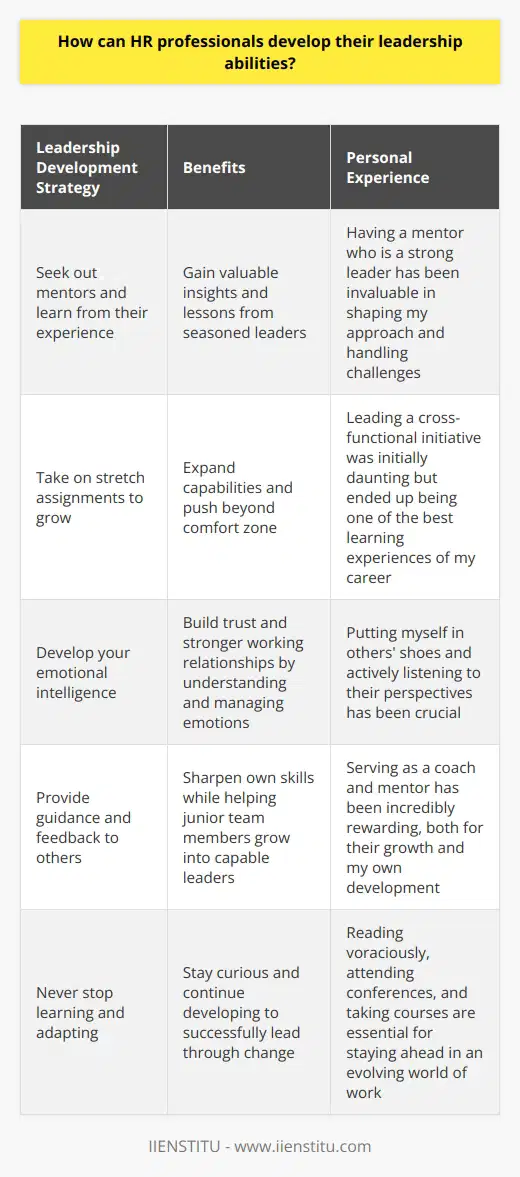
What are some ways to enhance problem-solving skills in HR?
As an HR professional, there are several ways to enhance your problem-solving skills:
Develop a Systematic Approach
When faced with a problem, take a step back and analyze it from all angles. Break it down into smaller, manageable parts. This will help you identify the root cause and potential solutions.
Learn from Past Experiences
Reflect on how you've handled similar situations in the past. What worked well? What could you have done differently? Use these insights to inform your current problem-solving approach.
Collaborate with Others
Don't be afraid to seek input from colleagues or mentors. Brainstorming with others can lead to creative solutions you may not have considered on your own.
Stay Up-to-Date on Industry Trends
Attend conferences, read industry publications, and participate in online forums. Staying informed about the latest HR trends and best practices can help you anticipate and address potential problems before they arise.
Practice Active Listening
When employees come to you with concerns, give them your full attention. Ask clarifying questions and repeat back what you've heard to ensure understanding. This will help you gather all the necessary information to effectively solve the problem.
Embrace a Growth Mindset
View challenges as opportunities for learning and growth. Don't be discouraged by setbacks; instead, use them as a chance to reassess and try a different approach.
By implementing these strategies, you can become a more effective problem-solver in your HR role.
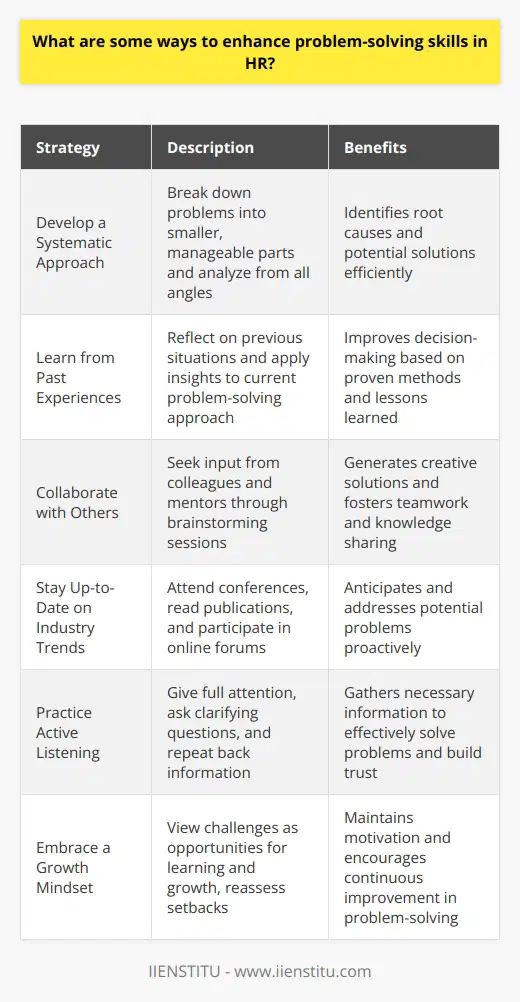
How can HR professionals improve their decision-making capabilities?
As an HR professional, I believe there are several ways to enhance decision-making capabilities:
Gather Diverse Perspectives
I always try to seek input from colleagues with different backgrounds and experiences. This helps me consider multiple angles before reaching a conclusion.
Analyze Data and Trends
In my experience, leveraging HR analytics provides valuable insights for making informed choices. I regularly review metrics like turnover rates, engagement scores, and performance indicators to spot patterns and areas for improvement.
Develop Critical Thinking
I've found that honing my critical thinking skills through training and practice is crucial. Asking probing questions, evaluating evidence objectively, and recognizing biases leads to sounder judgments.
Learn From Mistakes
None of us are perfect, and I've certainly made my share of mistakes! However, I believe reflecting on past decisions, both good and bad, is an invaluable way to grow. Examining outcomes teaches important lessons for the future.
Stay Current on Best Practices
The field of HR is constantly evolving, so I make an effort to stay up-to-date. I regularly attend conferences, read industry publications, and participate in professional networks to learn about emerging trends and strategies.
Ultimately, I think becoming a stronger decision-maker is an ongoing journey. It requires continuous learning, self-reflection, and a willingness to adapt. By combining these approaches, I strive to make the best choices to support my organization and our people.
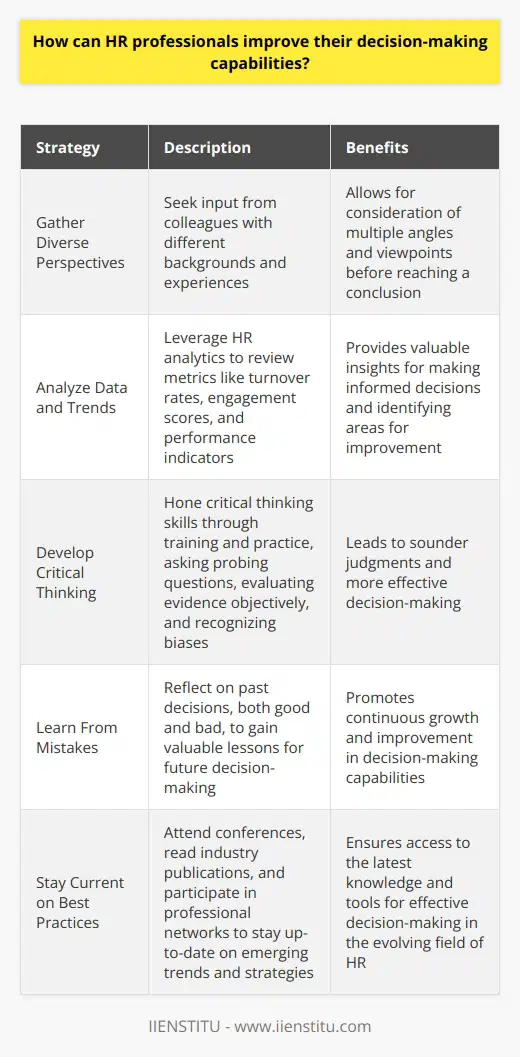
What are the best practices for developing strong interpersonal skills in HR?
As an HR professional, developing strong interpersonal skills is crucial for success. Here are some best practices I've learned through my own experiences and observations:
Actively Listen and Empathize
One of the most important skills is active listening. Really focus on understanding the other person's perspective and feelings. Put yourself in their shoes and try to empathize with their situation. I find that when people feel truly heard and understood, it builds trust and rapport.
Communicate Clearly and Respectfully
When communicating, aim for clarity and respect. Choose your words thoughtfully. Be direct but also kind and professional. I've noticed that small things like tone of voice and body language make a big difference in how messages are received. When in doubt, err on the side of being more gentle and diplomatic.
Build Relationships and Trust
Take the time to get to know your colleagues as individuals. Learn about their interests, goals, and challenges. Share a bit about yourself too. Building genuine relationships makes working together much smoother. People are more open and cooperative with those they know and trust. I try to have casual chats and check-ins with my team regularly, not just about work.
Handle Conflict Constructively
Conflicts are inevitable, but they don't have to be destructive. When issues arise, focus on the problem not the person. Stay calm and look for win-win solutions. I find it helpful to get the conflicting parties together to talk it out openly, with a mediator if needed. The goal should be to resolve matters fairly and preserve relationships.
Developing interpersonal skills takes ongoing effort and practice. But in my experience, it's well worth the investment. Strong relationships and communication are the foundation for success in HR and beyond.
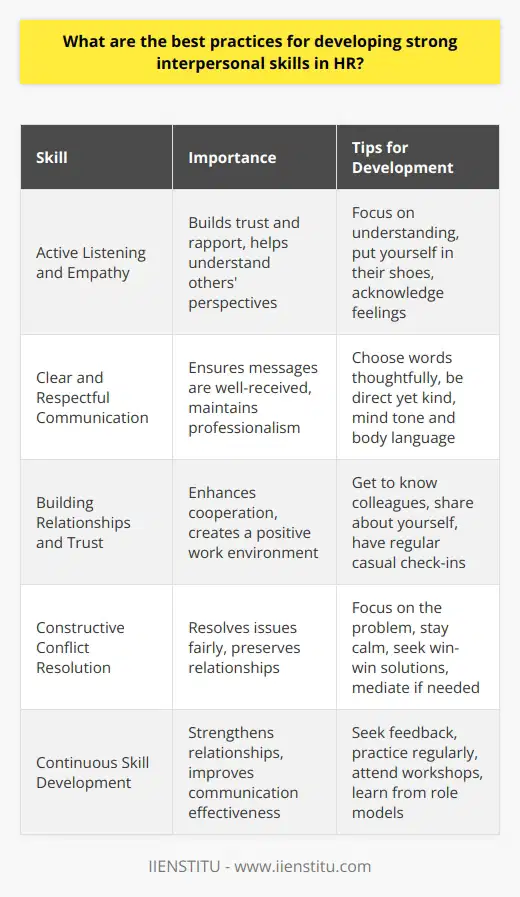
How can HR professionals refine their negotiation techniques?
As an HR professional, refining your negotiation techniques is crucial for success in your role. Here are some tips to help you improve your negotiation skills:
Prepare thoroughly
Before entering any negotiation, make sure you have done your research. Understand the other party's needs, goals, and potential objections. Anticipate their questions and prepare your responses in advance. The more prepared you are, the more confident and persuasive you will be during the negotiation.
Listen actively
Effective negotiation is not just about presenting your own ideas and demands. It's also about listening to the other party and understanding their perspective. Practice active listening by paying attention to their words, tone, and body language. Ask questions to clarify their position and show that you value their input.
Find common ground
In any negotiation, it's important to find areas of agreement and common interest. Look for win-win solutions that benefit both parties. Be willing to compromise and make concessions where appropriate, but also stand firm on your key priorities.
Use persuasive language
The language you use can have a big impact on the outcome of a negotiation. Use positive, confident language that focuses on the benefits of your proposal. Avoid negative or confrontational language that may put the other party on the defensive.
Practice regularly
Like any skill, negotiation improves with practice. Look for opportunities to negotiate in your daily life, whether it's with colleagues, vendors, or even family members. The more you practice, the more comfortable and confident you will become in high-stakes negotiations.
By following these tips and continuously refining your techniques, you can become a more effective negotiator and achieve better outcomes for your organization.
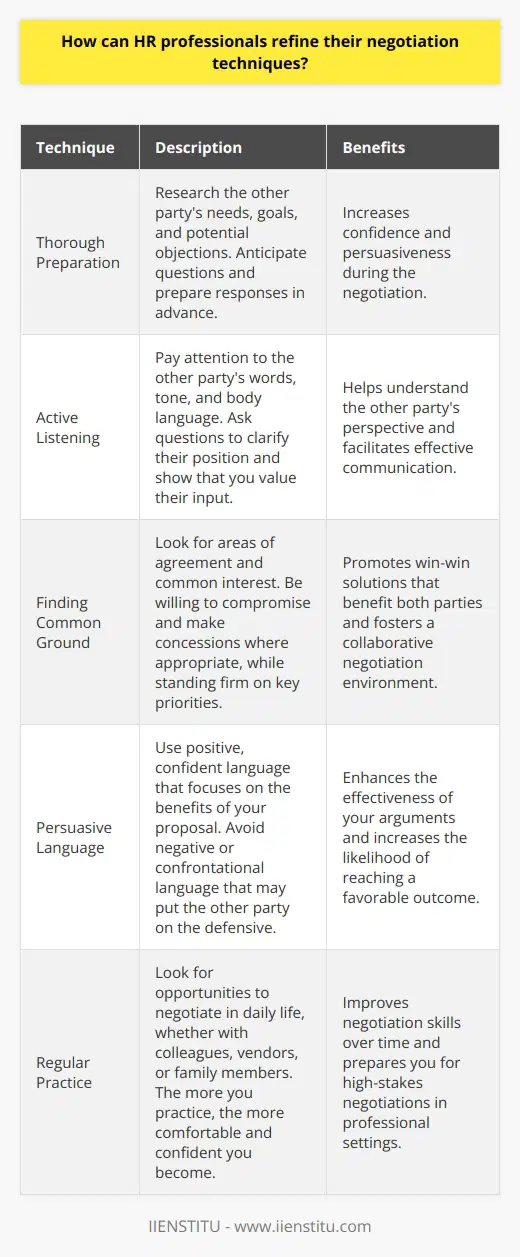
What are some effective ways to build empathy skills in HR?
As an HR professional, building empathy skills is crucial for creating a positive work environment. Here are some effective ways to develop empathy in HR:
Practice Active Listening
When an employee comes to you with a concern, give them your full attention. Listen carefully, ask clarifying questions, and show that you understand their perspective.
Put Yourself in Their Shoes
Try to imagine how the employee feels in their situation. Consider their background, experiences, and challenges they may be facing. This helps you connect with them on a deeper level.
Encourage Open Communication
Create a safe space where employees feel comfortable sharing their thoughts and feelings. Regularly check in with them, and let them know your door is always open.
Attend Diversity and Inclusion Training
Participating in workshops and seminars can help you understand the experiences of employees from different backgrounds. You'll learn how to create a more inclusive workplace.
Recognize and Validate Emotions
When an employee expresses an emotion, acknowledge it. Saying something like, "I can see how frustrated you are," shows that you recognize and validate their feelings.
Empathy is a skill that requires practice and dedication.
I remember a time when an employee came to me in tears, overwhelmed by personal and work-related stress. By listening attentively and showing genuine concern, I was able to provide the support they needed.
Building empathy takes time, but it's worth the effort. When employees feel understood and valued, they're more engaged and productive. As an HR professional, empathy is one of the most powerful tools in your toolkit.

How can HR professionals improve their active listening abilities?
As an HR professional, active listening is a crucial skill to master. It's not just about hearing the words someone says, but truly understanding their message and feelings. Here are some ways to improve your active listening abilities:
Practice Focusing Your Attention
When someone is speaking to you, give them your full attention. I know it can be tough with all the distractions in our modern world, but really try to focus on the person in front of you. Put away your phone, ignore those email notifications, and just be present in the conversation.
Show That You're Listening
Use nonverbal cues to show the speaker that you're engaged. I like to make eye contact, nod my head, and lean in slightly. These small gestures can make a big difference in helping the other person feel heard and understood.
Ask Clarifying Questions
If something is unclear, don't be afraid to ask for more information. Saying something like, "Can you tell me more about that?" or "I want to make sure I understand, could you clarify what you mean by...?" shows that you're actively trying to comprehend their message.
Reflect and Summarize
Paraphrasing what the speaker has said is a great way to ensure you're on the same page. I often start with phrases like, "So what I'm hearing is..." or "It sounds like you're saying..." This gives the speaker a chance to correct any misunderstandings and shows that you're truly listening.
Avoid Interrupting or Judging
It can be tempting to jump in with advice or opinions, but try to resist that urge. Let the speaker finish their thoughts before responding. And even if you disagree with what they're saying, try to keep an open mind and avoid making judgments.
Remember, active listening takes practice and patience. But by implementing these strategies, you can become a more effective communicator and build stronger relationships with your colleagues and employees.
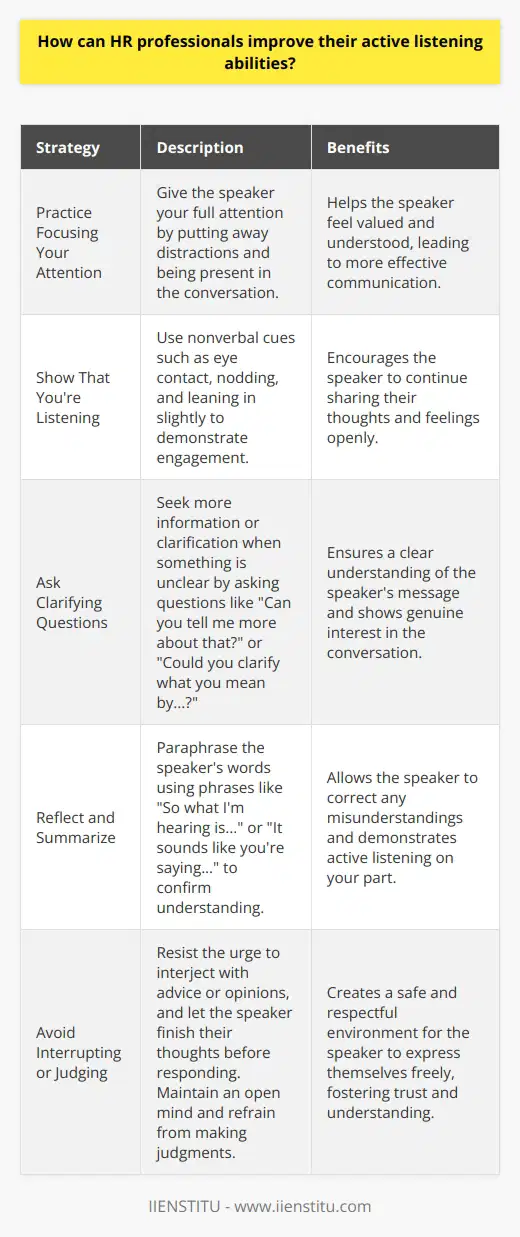
What strategies can HR use to develop their strategic thinking skills?
As an HR professional, developing strategic thinking skills is crucial for driving organizational success. Here are some strategies that can help:
Seek out learning opportunities
I've found that continuous learning is essential. Attend conferences, workshops, and webinars to expand your knowledge and gain new perspectives. Last year, I participated in a leadership retreat that really challenged my thinking and helped me approach problems more strategically.
Analyze data and trends
To think strategically, you need to understand the big picture. Regularly review HR metrics, industry trends, and competitor activities. I make it a habit to dedicate time each week to diving into our employee engagement survey results and identifying patterns that could impact our long-term plans.
Collaborate with other departments
Don't operate in a silo. Partner with leaders from finance, marketing, operations, etc. to gain insights into their challenges and goals. I've built strong relationships with our sales team, which has helped me align our talent acquisition strategies with their revenue targets.
Practice scenario planning
Consider various "what if" scenarios and develop contingency plans. This helps you anticipate potential obstacles and adapt quickly. When the pandemic hit, my team had already mapped out remote work options, which allowed us to transition smoothly while supporting our employees' well-being.
Seek feedback and mentorship
Find a trusted mentor or coach who can provide guidance and constructive feedback on your strategic thinking abilities. I've been fortunate to have an experienced CHRO as a mentor. Our monthly coffee chats have been invaluable in helping me refine my critical thinking skills and consider new angles.
Remember, developing strategic thinking is an ongoing journey. Stay curious, embrace challenges, and continually look for ways to connect the dots between HR initiatives and business outcomes. With practice and persistence, you can become a more strategic partner and drive meaningful results for your organization.
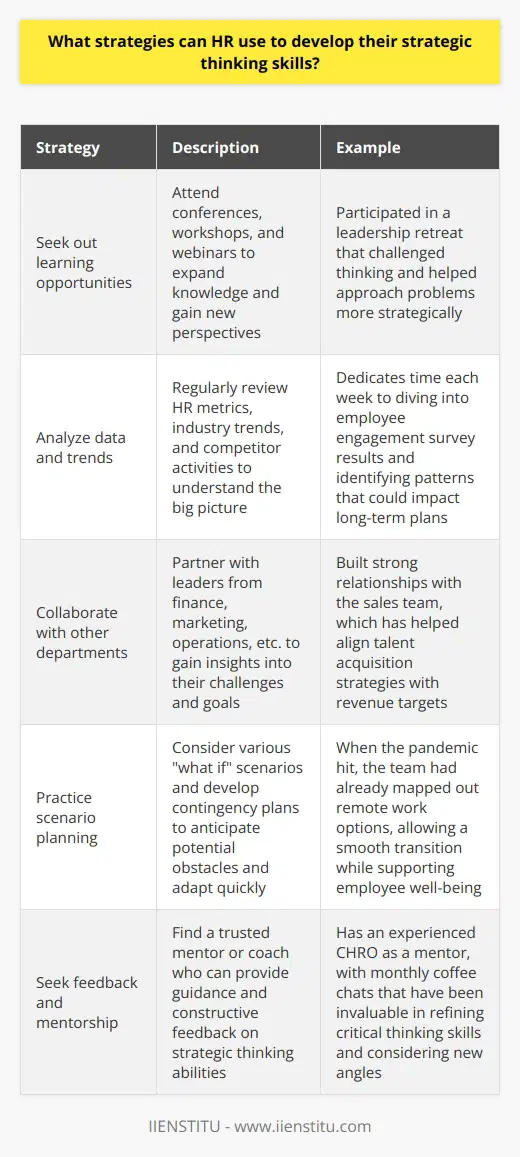
How can HR professionals enhance their project management capabilities?
As an HR professional, I believe that enhancing project management capabilities is crucial for success in today's fast-paced business environment. Here are some strategies I've found effective:
Develop a Strong Foundation
I started by gaining a solid understanding of project management principles, methodologies, and best practices. I took courses, attended workshops, and read extensively to build my knowledge base.
Embrace Technology
In my experience, leveraging project management software and tools can significantly streamline processes and improve collaboration. I've become proficient in using platforms like Asana, Trello, and Microsoft Project to keep projects organized and on track.
Foster Cross-Functional Collaboration
I've learned that effective project management requires strong collaboration skills. I actively engage with different departments, ensuring clear communication and alignment of goals. Building positive relationships with stakeholders has been key to smooth project execution.
Continuously Learn and Adapt
I believe that continuous learning is essential for growth. I stay updated on the latest project management trends and techniques by attending conferences, joining professional networks, and seeking mentorship opportunities.
Develop Leadership Skills
As an HR professional, I've focused on developing my leadership abilities. I strive to inspire and motivate team members, delegate tasks effectively, and make data-driven decisions to drive projects forward.
Embrace Agility
In today's dynamic business landscape, I've found that embracing agility is crucial. I've learned to be flexible, adapt to changes quickly, and iterate as needed to deliver successful projects.
By implementing these strategies, I've been able to enhance my project management capabilities and contribute to the success of my organization. I'm excited to bring these skills to this role and continue growing as an HR professional.
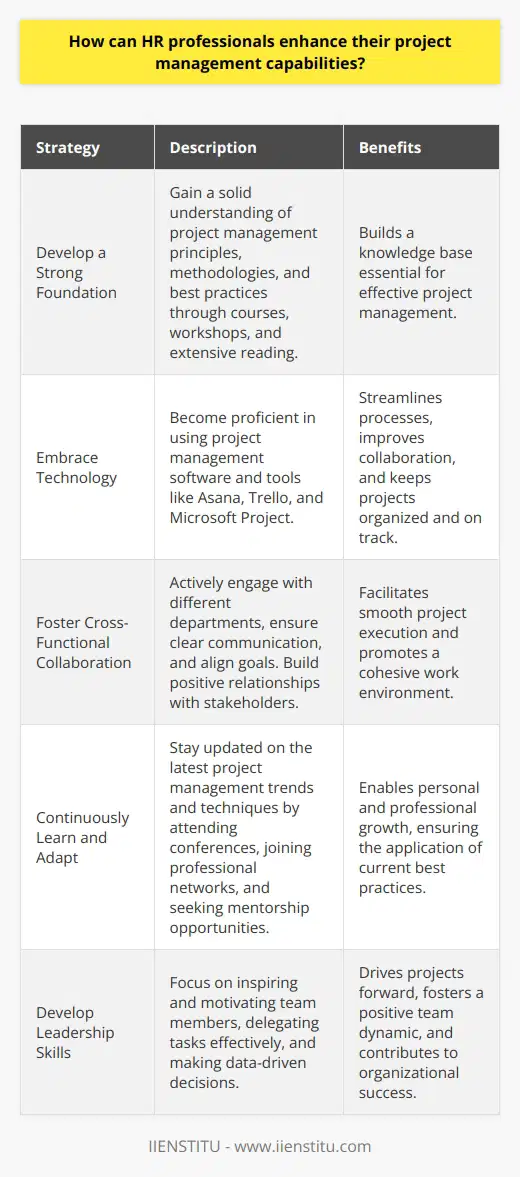
What are some ways to refine organizational skills in HR?
As an HR professional, I believe that refining organizational skills is crucial for success in this field. Over the years, I've discovered several effective ways to enhance these skills and boost productivity.
Prioritize tasks
One of the most important aspects of being organized is prioritizing your tasks effectively. I always start my day by creating a to-do list and identifying the most critical and time-sensitive tasks. This helps me focus on what matters most and ensures that I don't waste time on less important activities.
Use technology to your advantage
In today's digital age, there are countless tools and applications that can help streamline your work processes. I've found that using project management software like Trello or Asana can be incredibly helpful in keeping track of tasks, deadlines, and collaborations with colleagues.
Develop a filing system
Another key aspect of staying organized is having a clear and efficient filing system. I make sure to keep all my documents, both physical and digital, properly labeled and stored in designated folders. This saves me a lot of time and stress when I need to retrieve important information quickly.
Communicate effectively
Clear communication is essential for maintaining organization within a team. I always strive to keep my colleagues informed about my progress, any challenges I'm facing, and any updates they need to be aware of. This helps prevent misunderstandings and ensures that everyone is on the same page.
By implementing these strategies consistently, I've been able to significantly improve my organizational skills and become a more effective HR professional. It takes time and effort, but the benefits are well worth it in the long run.
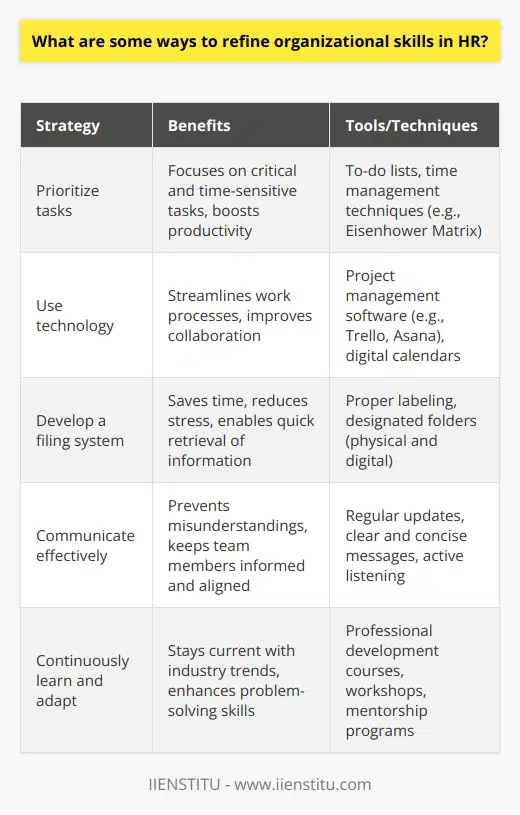
How can HR professionals improve their adaptability and flexibility?
As an HR professional, I believe that adaptability and flexibility are crucial skills in today's fast-paced work environment. One way to improve these skills is by embracing change and being open to new ideas. Whenever I encounter a new challenge or situation, I try to approach it with a positive attitude and a willingness to learn.
Continuous Learning
I think it's important for HR professionals to engage in continuous learning and professional development. By staying up-to-date with the latest trends and best practices in the field, we can better adapt to changing circumstances. Personally, I enjoy attending workshops, webinars, and conferences to expand my knowledge and skills.
Collaboration and Communication
Another way to improve adaptability and flexibility is by collaborating with colleagues and communicating effectively. I've found that working closely with my team and other departments helps me gain new perspectives and insights. By fostering open communication and building strong relationships, we can more easily navigate challenges and find creative solutions.
Embracing Technology
In my experience, embracing technology has also been key to improving my adaptability and flexibility as an HR professional. By leveraging digital tools and platforms, I can streamline processes, automate tasks, and respond more quickly to changing needs. For example, using a cloud-based HR system has allowed me to access important data and documents from anywhere, making it easier to adapt to remote work situations.
Agile Mindset
Finally, I believe that adopting an agile mindset is essential for HR professionals looking to improve their adaptability and flexibility. This means being willing to experiment, iterate, and pivot when necessary. It also means being comfortable with ambiguity and uncertainty, and trusting in your ability to navigate complex situations. By cultivating an agile mindset, we can become more resilient and responsive in the face of change.
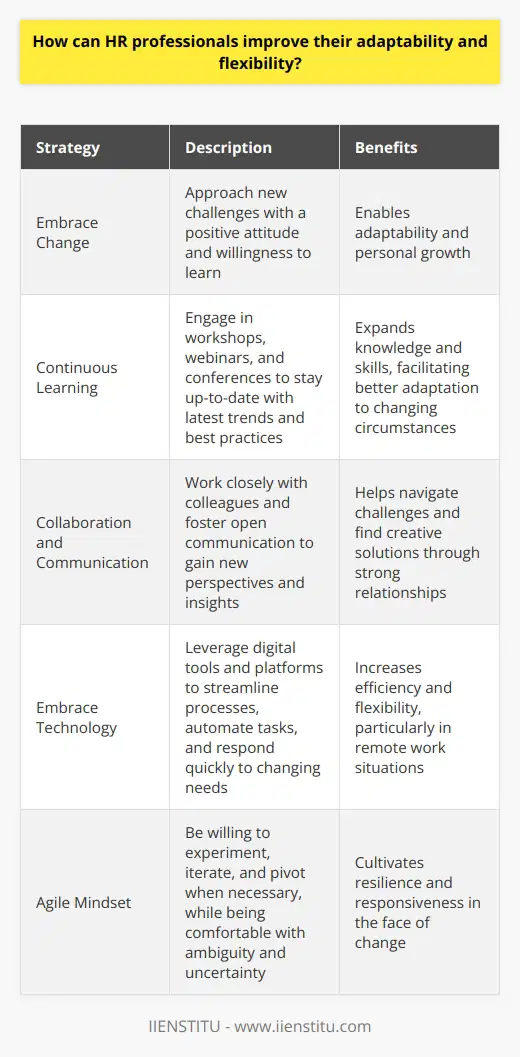
What are the best practices for developing strong coaching skills in HR?
To develop strong coaching skills in HR, one must first understand the fundamentals of effective communication. Active listening is crucial; pay close attention to what the employee is saying and ask clarifying questions. Building trust and rapport is also essential for creating a safe space where employees feel comfortable sharing their thoughts and concerns.
Set Clear Goals and Expectations
Work with the employee to set specific, measurable, achievable, relevant, and time-bound (SMART) goals. Clearly communicate your expectations and provide regular feedback on their progress. Celebrate their successes and help them learn from their failures.
Provide Ongoing Support and Resources
Offer your employees the tools, training, and resources they need to succeed in their roles. Be available to answer questions, provide guidance, and offer support when needed. Encourage them to take ownership of their development and seek out learning opportunities.
Lead by Example
As an HR coach, it's important to model the behaviors and attitudes you want to see in your employees. Demonstrate a growth mindset, embrace change, and be open to feedback. Show empathy and compassion, and treat everyone with respect and professionalism.
Continuously Improve Your Own Skills
Invest in your own professional development to stay up-to-date on the latest coaching techniques and best practices. Attend workshops, read books, and seek out mentorship opportunities. The more you grow as a coach, the better equipped you'll be to support your employees' growth and development.
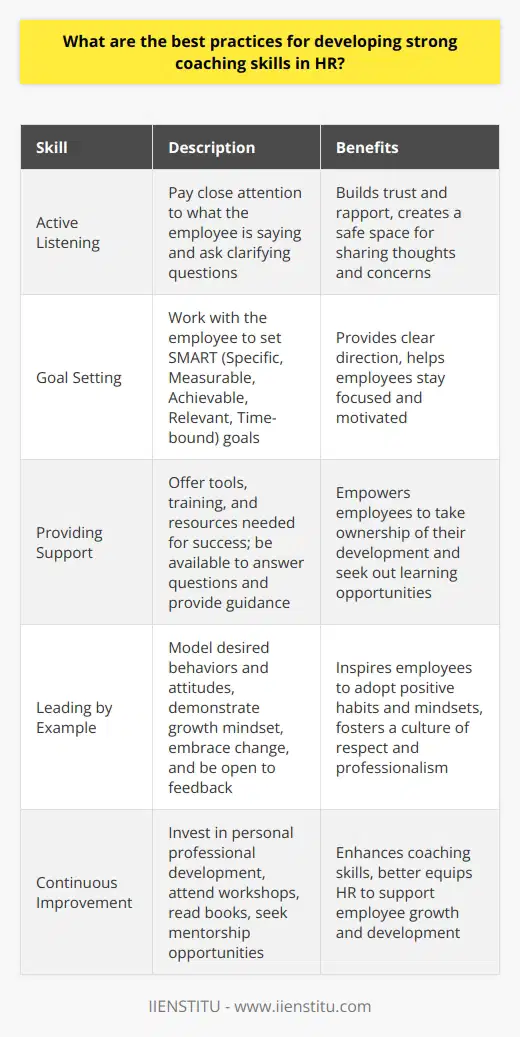
How can HR professionals refine their change management abilities?
As an HR professional, refining your change management abilities is crucial for successfully navigating organizational transitions. Here are some strategies to consider:
Embrace a Growth Mindset
Approach change with curiosity and a willingness to learn. Continuously seek opportunities to expand your knowledge and skills. Attending workshops, reading industry publications, and participating in online courses can help you stay up-to-date with the latest change management techniques.
Foster Open Communication
Effective communication is the foundation of successful change initiatives. Encourage open dialogue and actively listen to employee concerns. I've found that holding regular town hall meetings and creating anonymous feedback channels can help foster trust and transparency during times of change.
Lead by Example
As an HR professional, your actions set the tone for the organization. Embrace change with a positive attitude and model the behaviors you expect from others. When I led a major restructuring project, I made sure to maintain a calm and optimistic demeanor, even when faced with challenges. This helped inspire confidence in my team and kept morale high.
Collaborate with Key Stakeholders
Change management is a team effort. Build strong relationships with leaders across the organization and involve them in the planning process. I've found that hosting cross-functional workshops can help align everyone around a shared vision and identify potential roadblocks early on.
Measure and Adapt
Change is an iterative process. Regularly assess the impact of your initiatives and be prepared to adjust your approach as needed. Setting clear metrics and gathering feedback from employees can help you stay on track and make data-driven decisions.
By embracing these strategies, HR professionals can become more agile and effective change leaders, helping their organizations thrive in an ever-evolving business landscape.
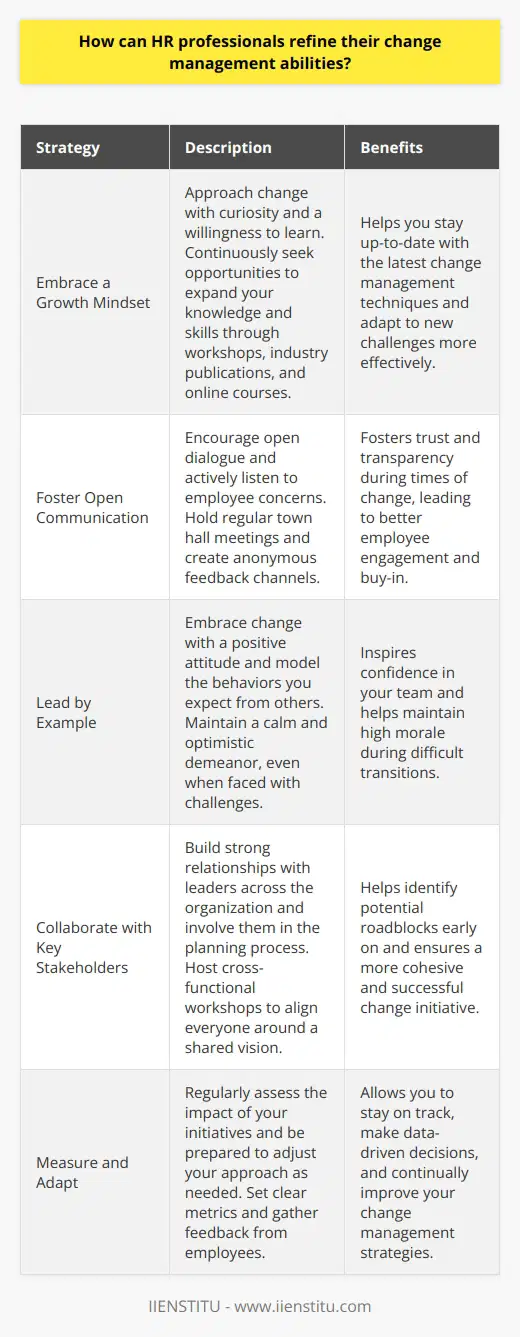
What are some effective ways to build cultural awareness skills in HR?
Building cultural awareness skills in HR is crucial for creating an inclusive and diverse workplace. Here are some effective ways to achieve this:
Educate Yourself
As an HR professional, I make it a priority to continuously learn about different cultures and backgrounds. I attend workshops, read books, and engage in conversations with colleagues from diverse backgrounds. This helps me gain a deeper understanding and appreciation for the unique perspectives and experiences that each individual brings to the workplace.
Encourage Open Communication
Fostering an environment where employees feel comfortable sharing their thoughts and experiences is key. I strive to create safe spaces for open dialogue, such as diversity and inclusion forums or employee resource groups. By actively listening and valuing different viewpoints, we can build trust and understanding among team members.
Celebrate Diversity
Embracing and celebrating the rich tapestry of cultures within our organization is essential. I love organizing cultural events, such as heritage months or multicultural potlucks, where employees can showcase their traditions and customs. These initiatives not only educate but also bring people together, strengthening the bonds of our diverse workforce.
Lead by Example
As an HR leader, I believe in walking the talk when it comes to cultural awareness. I make a conscious effort to be inclusive in my language, actions, and decision-making processes. By modeling respectful and culturally sensitive behavior, I hope to inspire others to follow suit and create a ripple effect throughout the organization.
Collaborate with Experts
Building partnerships with diversity and inclusion experts can provide valuable insights and guidance. I recently worked with a consultant who helped us assess our current practices and develop a roadmap for enhancing cultural competence. Collaborating with experienced professionals ensures that our initiatives are effective and aligned with best practices in the field.
By implementing these strategies, HR professionals can cultivate a workplace that values and leverages the strength of its diverse workforce. It's a journey that requires ongoing commitment, but the rewards of increased innovation, employee engagement, and organizational success make it well worth the effort.
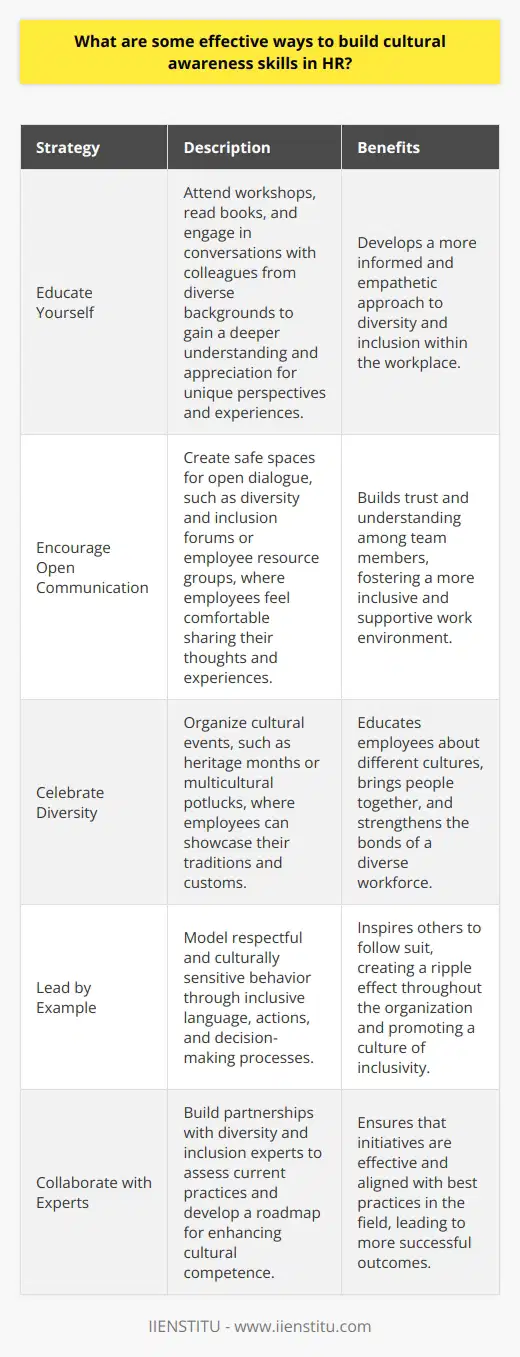
How can HR professionals improve their data analysis capabilities?
As an HR professional, there are several ways to improve your data analysis capabilities:
Develop a Strong Foundation in Data Analysis
Start by learning the basics of data analysis, such as statistics, data visualization, and data manipulation. Take online courses, attend workshops, or earn certifications to build your skills. I remember struggling with statistics in college, but with persistence and practice, I eventually got the hang of it.
Use the Right Tools
Familiarize yourself with data analysis tools like Excel, Tableau, or R. These tools can help you organize, analyze, and visualize data more efficiently. When I first started using Tableau, I was overwhelmed by all the features, but watching tutorials and experimenting with the software helped me become proficient.
Collaborate with Other Departments
Work closely with other departments, such as finance or marketing, to gain insights from their data. Collaborating with colleagues from different backgrounds can provide new perspectives and ideas for analysis. I once worked on a project with our marketing team to analyze employee engagement data, and their insights helped us create a more targeted retention strategy.
Stay Current with Industry Trends
Keep up with the latest trends and best practices in HR data analysis. Attend conferences, read industry publications, and join online communities to stay informed. I always look forward to attending the annual HR Technology Conference to learn about the latest innovations and connect with other professionals.
By continually learning and applying these strategies, HR professionals can become more confident and effective in their data analysis capabilities. It's not always easy, but with dedication and a willingness to learn, anyone can improve their skills and make data-driven decisions to support their organization's success.
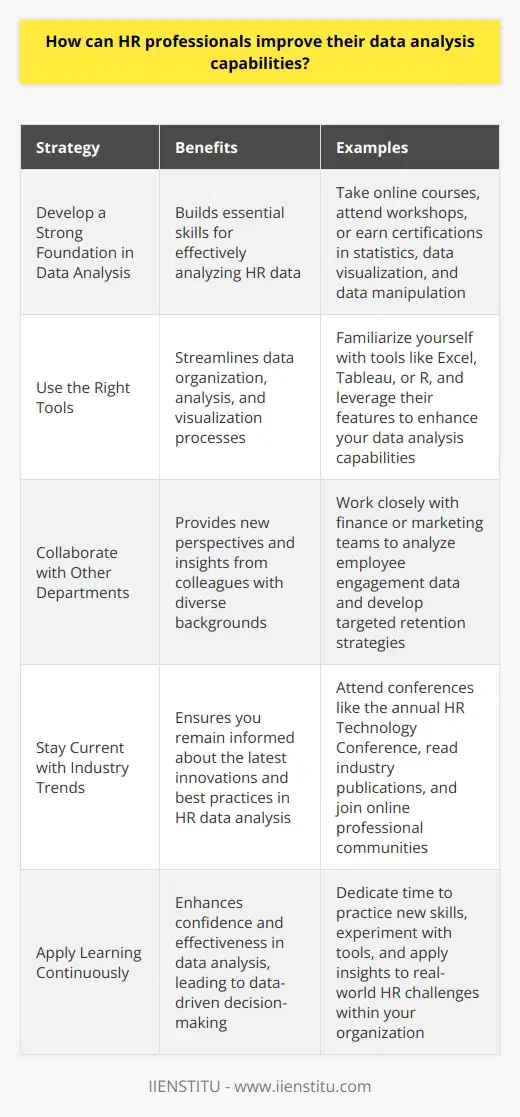
What strategies can HR use to develop their employee relations skills?
As an HR professional, developing strong employee relations skills is crucial for creating a positive work environment. One effective strategy is to actively listen to employees' concerns and feedback. By giving them your full attention and empathy, you demonstrate that their opinions matter and foster open communication.
Encourage Regular Check-Ins
I've found that scheduling regular one-on-one meetings with team members helps build trust and rapport. These check-ins provide opportunities to discuss goals, challenges, and career aspirations in a more personal setting. It's a chance to offer guidance and support, showing that you're invested in their growth and well-being.
Recognize and Celebrate Achievements
Everyone appreciates being acknowledged for their hard work and contributions. Make it a habit to celebrate milestones, both big and small. Whether it's a public shout-out during a team meeting or a heartfelt thank-you note, genuine recognition goes a long way in boosting morale and engagement.
Foster a Culture of Transparency
In my experience, employees value transparency from their HR department. Be proactive in communicating company updates, policy changes, and decision-making processes. When people feel informed and included, they're more likely to trust leadership and feel connected to the organization's mission.
Lead by Example
As an HR professional, your actions set the tone for the entire company. Model the behaviors and values you wish to see in others. Treat everyone with respect, kindness, and professionalism. When you lead by example, employees are more likely to follow suit and contribute to a positive workplace culture.
Remember, building strong employee relations takes time, effort, and genuine care. By prioritizing open communication, recognition, transparency, and leading by example, you can create a work environment where employees feel valued, supported, and engaged.
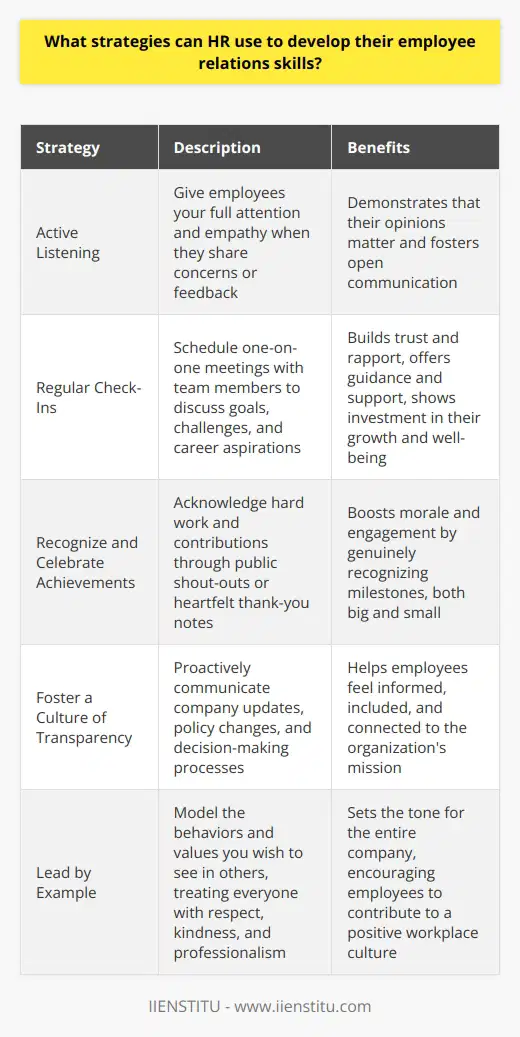
How can HR professionals enhance their talent acquisition techniques?
As an HR professional, I believe that enhancing talent acquisition techniques is crucial for building a strong workforce. Over the years, I've learned that a multi-faceted approach works best.
Leverage Technology
Embracing technology has been a game-changer for me. I've found that applicant tracking systems streamline the hiring process. They help me efficiently screen resumes and identify top candidates.
Social media is another powerful tool. I use it to actively reach out to potential hires and showcase our company culture. Platforms like LinkedIn allow me to connect with a wider talent pool.
Focus on Candidate Experience
I always aim to create a positive candidate experience. I believe in treating every applicant with respect and professionalism. Clear communication and timely feedback are key.
I also strive to make the application process user-friendly. I've found that a complicated or lengthy process can deter great candidates. Simplifying it has helped me attract more top talent.
Build a Strong Employer Brand
In my experience, a strong employer brand is a magnet for top talent. I work closely with our marketing team to showcase our company values and culture.
We highlight our employee benefits, growth opportunities, and positive work environment. This helps us stand out in a competitive job market. Candidates are drawn to companies that align with their values.
Continuously Adapt and Improve
I believe that talent acquisition is an ever-evolving field. I make it a point to stay up-to-date with the latest trends and best practices.
I regularly attend industry conferences and webinars. I also seek feedback from hiring managers and new hires. This helps me continuously refine and improve our hiring strategies.
Enhancing talent acquisition techniques is an ongoing journey. By leveraging technology, focusing on candidate experience, building a strong employer brand, and continuously adapting, I believe HR professionals can attract and retain top talent.
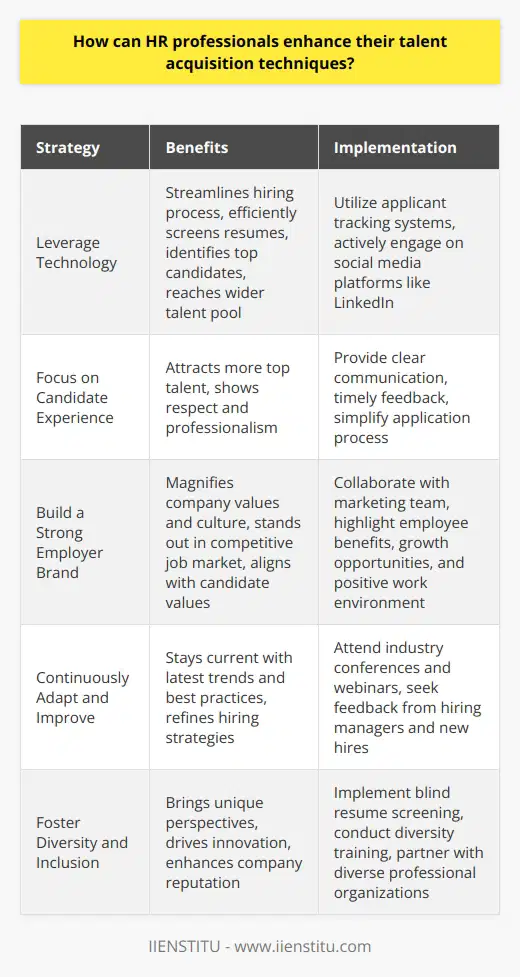
What are some ways to refine performance management skills in HR?
To refine performance management skills in HR, consider the following strategies:
Develop Clear Goals and Expectations
I've found that setting well-defined, measurable goals is essential for effective performance management. When expectations are clear, employees understand what they need to achieve and can work towards those objectives with purpose and clarity.
Provide Regular Feedback
In my experience, offering frequent, constructive feedback is crucial for employee growth and development. I make it a point to have regular check-ins with team members, discussing their progress, strengths, and areas for improvement. This ongoing dialogue helps foster a culture of continuous learning and improvement.
Embrace Technology
Leveraging performance management software can streamline the process and provide valuable insights. These tools allow for easy goal tracking, performance data analysis, and communication between managers and employees. I've seen firsthand how embracing technology can make performance management more efficient and effective.
Foster a Coaching Mindset
I believe that adopting a coaching mindset is key to successful performance management. Instead of simply evaluating performance, focus on guiding and supporting employees in their professional development. Ask questions, provide resources, and help them identify areas for growth. When managers act as coaches, employees feel supported and empowered to reach their full potential.
Remember, refining performance management skills is an ongoing journey. By setting clear goals, providing regular feedback, leveraging technology, and embracing a coaching mindset, you can create a culture of high performance and employee engagement.
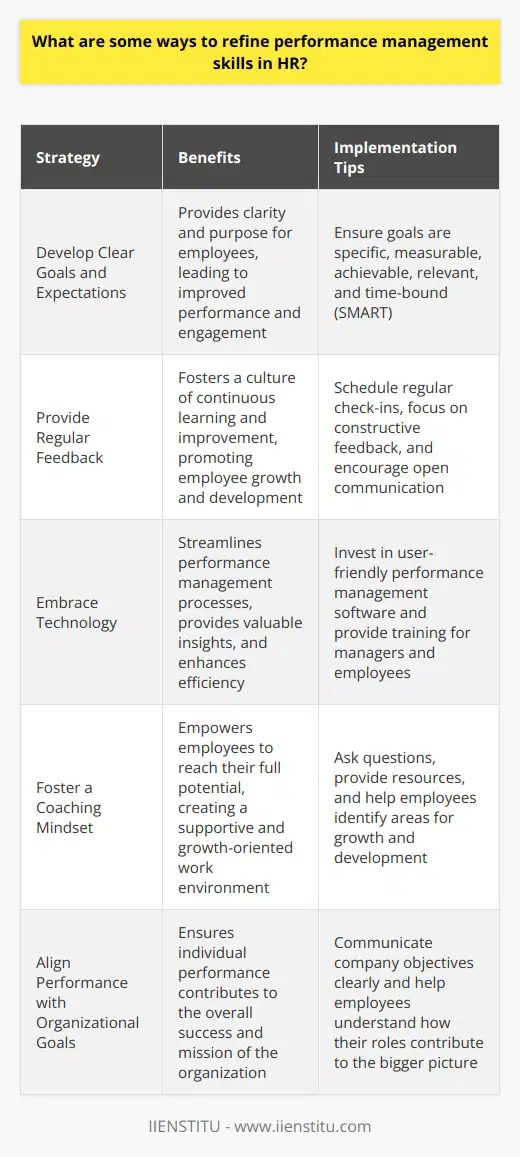
How can HR professionals improve their employee engagement strategies?
As an HR professional, I believe that improving employee engagement requires a multifaceted approach. In my experience, focusing on communication, recognition, and growth opportunities can make a significant difference in how connected and motivated employees feel.
Prioritize Open Communication
One key strategy is to foster open and transparent communication across the organization. Encourage managers to have regular check-ins with their team members, not just about work tasks but also to listen to their concerns and ideas. I've found that when employees feel heard and valued, they're more likely to be engaged and committed to their work.
Recognize and Reward Achievements
Another effective way to boost engagement is through meaningful recognition and rewards. Celebrate milestones, both big and small, and acknowledge the hard work and dedication of your employees. Whether it's a public shout-out, a bonus, or a personalized gift, showing appreciation can go a long way in making people feel valued and motivated to continue giving their best.
Provide Growth and Development Opportunities
Investing in your employees' professional growth is also crucial for engagement. Offer training programs, mentorship opportunities, and clear career paths so that people can see a future for themselves within the company. When employees feel like they're learning and growing, they're more likely to be engaged and committed to their work.
Ultimately, improving employee engagement requires consistent effort and a genuine commitment to creating a positive work environment. By prioritizing open communication, recognition, and growth opportunities, HR professionals can help build a culture where employees feel valued, supported, and motivated to succeed.
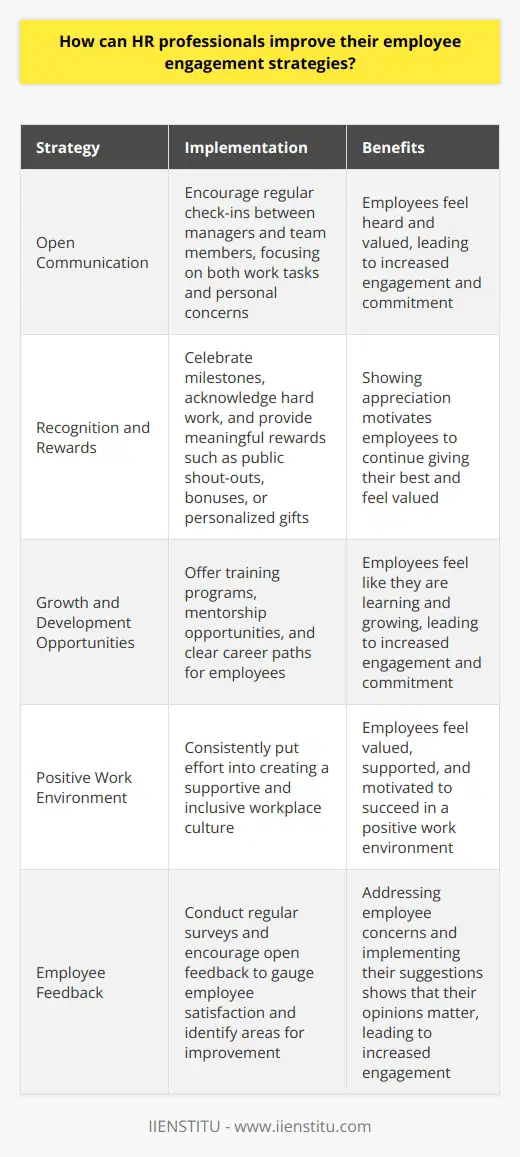
What are the best practices for developing strong diversity and inclusion skills in HR?
As an HR professional, developing strong diversity and inclusion skills is crucial for creating a welcoming and equitable workplace. Here are some best practices I've learned through my experience:
Educate Yourself Continuously
I make it a priority to stay informed about diversity and inclusion topics. I attend workshops, read books and articles, and listen to diverse perspectives to expand my understanding.
Engage in Self-Reflection
Regularly examining my own biases, privileges, and blind spots helps me grow. I ask myself tough questions and strive to be more inclusive in my thoughts and actions.
Foster Open Communication
Creating a safe space for honest conversations is essential. I encourage employees to share their experiences and perspectives, and I actively listen without judgment.
Develop Inclusive Policies and Practices
I work closely with leadership to develop policies that promote fairness and equity. This includes things like diverse hiring practices, equal pay, and inclusive benefits.
Celebrate Diversity
Recognizing and appreciating the unique contributions of each individual fosters a sense of belonging. I enjoy planning events and initiatives that showcase and celebrate the diversity within our organization.
Hold Everyone Accountable
Diversity and inclusion is everyone's responsibility. I collaborate with managers to set clear expectations and hold individuals accountable for creating an inclusive environment.
Developing strong diversity and inclusion skills is an ongoing journey. By staying committed to learning, self-reflection, and action, we can build workplaces where everyone feels valued and empowered to succeed.
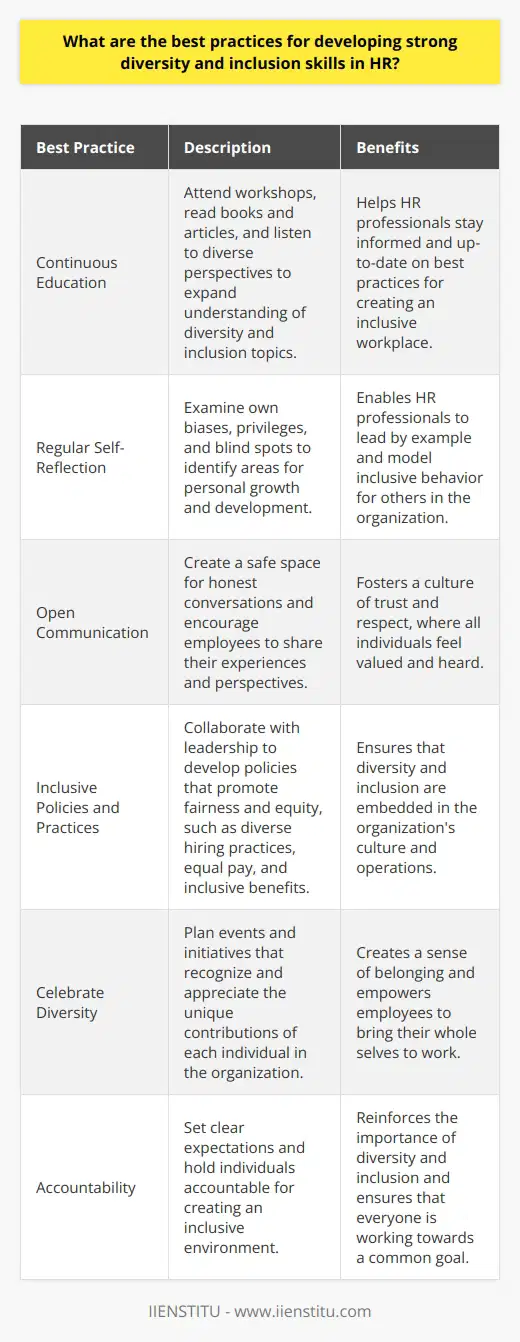
How can HR professionals refine their workforce planning abilities?
As an HR professional, I believe that refining workforce planning abilities is crucial for organizational success. Through my experience, I've learned that effective workforce planning requires a strategic and proactive approach.
Understand Business Objectives
First and foremost, HR professionals must clearly understand the organization's short-term and long-term goals. This understanding enables them to align workforce planning with business objectives, ensuring that the right talent is in place to achieve desired outcomes.
Conduct Thorough Workforce Analysis
Conducting a comprehensive analysis of the current workforce is essential. This analysis should include assessing skills, competencies, and demographic data. By identifying gaps and forecasting future needs, HR professionals can make informed decisions about talent acquisition, development, and retention strategies.
Collaborate with Business Leaders
Collaboration with business leaders is key to refining workforce planning. HR professionals should actively engage with department heads and executives to gain insights into their specific talent requirements. This partnership allows for a shared understanding of workforce challenges and opportunities.
Leverage Data and Analytics
In today's data-driven world, leveraging analytics is crucial for effective workforce planning. HR professionals should utilize workforce metrics, such as turnover rates, time-to-fill, and productivity measures. By analyzing this data, they can identify trends, make data-driven decisions, and continually refine their planning processes.
Embrace Flexibility and Adaptability
The business landscape is constantly evolving, and HR professionals must embrace flexibility in their workforce planning approach. They should be open to exploring alternative talent solutions, such as contingent workers or remote teams. Adaptability allows HR to quickly respond to changing business needs and ensure the right talent is available when needed.
By focusing on these key areas, HR professionals can continually refine their workforce planning abilities. It's an ongoing process that requires dedication, collaboration, and a willingness to learn and adapt. Through strategic workforce planning, HR can contribute to the organization's success and drive long-term growth.
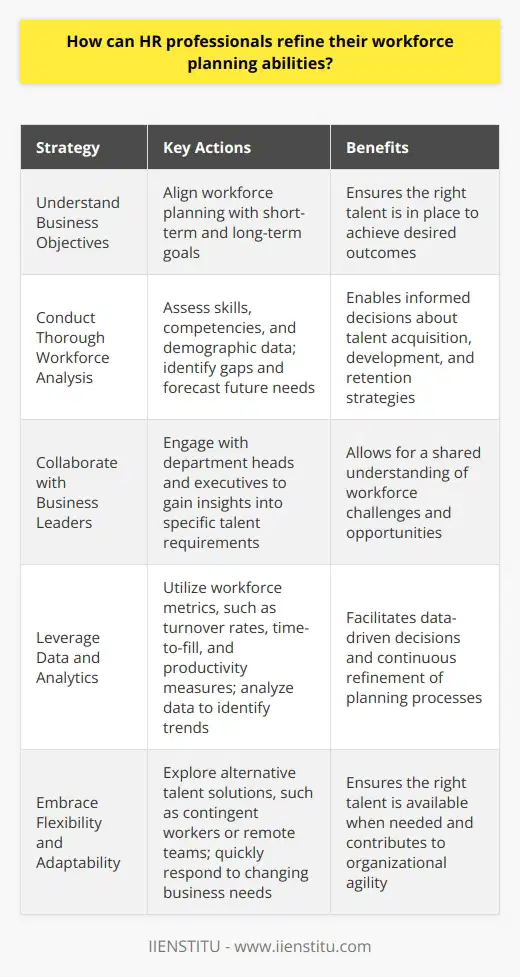
What are some effective ways to build employee development skills in HR?
As an HR professional, I believe that investing in employee development is crucial for organizational success. Over the years, I've found several effective ways to build employee development skills:
Conduct Regular Skills Assessments
I make it a point to assess employees' skills and competencies regularly. This helps identify areas for improvement and tailor development plans accordingly.
Offer Diverse Training Opportunities
I strive to provide a mix of training methods, including workshops, seminars, e-learning courses, and on-the-job training. Variety keeps employees engaged and caters to different learning styles.
Encourage Mentoring and Coaching
I've seen the power of mentoring and coaching firsthand. Pairing experienced employees with less experienced ones fosters knowledge sharing and skill development in a supportive environment.
Support Continuous Learning
I believe in promoting a culture of continuous learning. Encouraging employees to attend conferences, pursue certifications, and engage in self-directed learning keeps their skills sharp and relevant.
Provide Stretch Assignments
Challenging employees with stretch assignments that push them out of their comfort zones can accelerate skill development. I've watched employees grow tremendously when given these opportunities.
Evaluate and Refine
Regularly evaluating the effectiveness of development initiatives is key. I gather feedback, track progress, and make adjustments to ensure we're meeting employees' needs and seeing real results.
Building employee development skills takes commitment and a multifaceted approach, but the payoff is well worth it. When we invest in our people, everyone wins.
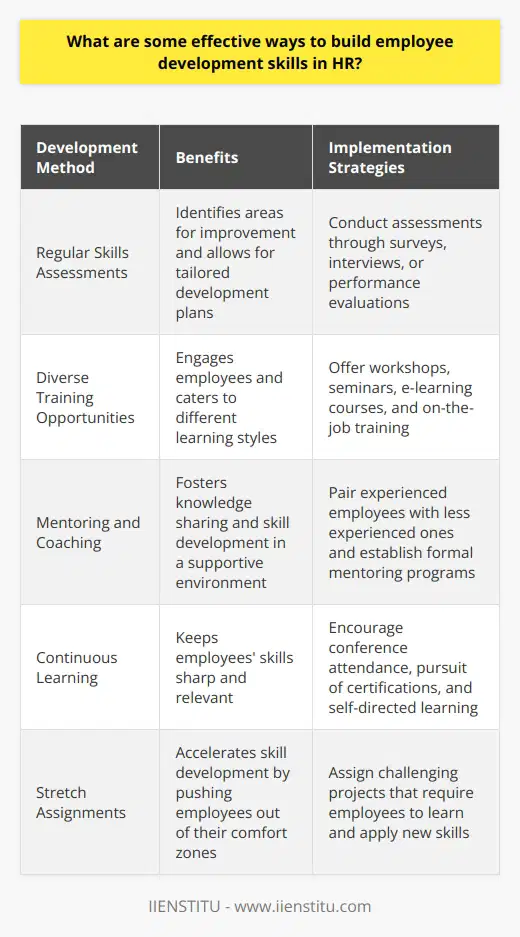
How can HR professionals improve their compensation and benefits management?
As an HR professional, I believe that improving compensation and benefits management is crucial for attracting and retaining top talent. Here are a few strategies that I've found effective in my own experience:
Conduct Regular Market Research
Staying up-to-date on industry trends and competitor offerings is essential. I make it a point to regularly review salary surveys and participate in benchmarking studies. This helps ensure that our compensation packages remain competitive and fair.
Foster Open Communication
Transparency is key when it comes to compensation and benefits. I've found that hosting regular information sessions and providing easy access to resources helps employees better understand and appreciate what's being offered. Encouraging open dialogue also allows for valuable feedback and suggestions.
Tailor Benefits to Employee Needs
One size doesn't fit all when it comes to benefits. I've had success with surveying employees to identify their unique needs and preferences. Based on this insight, we've introduced flexible options like remote work opportunities and wellness programs that have been well-received.
Align with Organizational Goals
Compensation and benefits should support the overall mission and objectives of the company. I work closely with leadership to ensure that our offerings are aligned with strategic priorities. This has helped us attract candidates who are not only skilled but also share our values.
Continuously Evaluate and Improve
Effective compensation and benefits management is an ongoing process. I believe in regularly assessing the impact of our programs and making data-driven improvements. Seeking out employee feedback and monitoring key metrics like retention rates have been instrumental in refining our approach over time.
By prioritizing these areas, I'm confident that HR professionals can develop compensation and benefits strategies that truly support and engage their workforce.
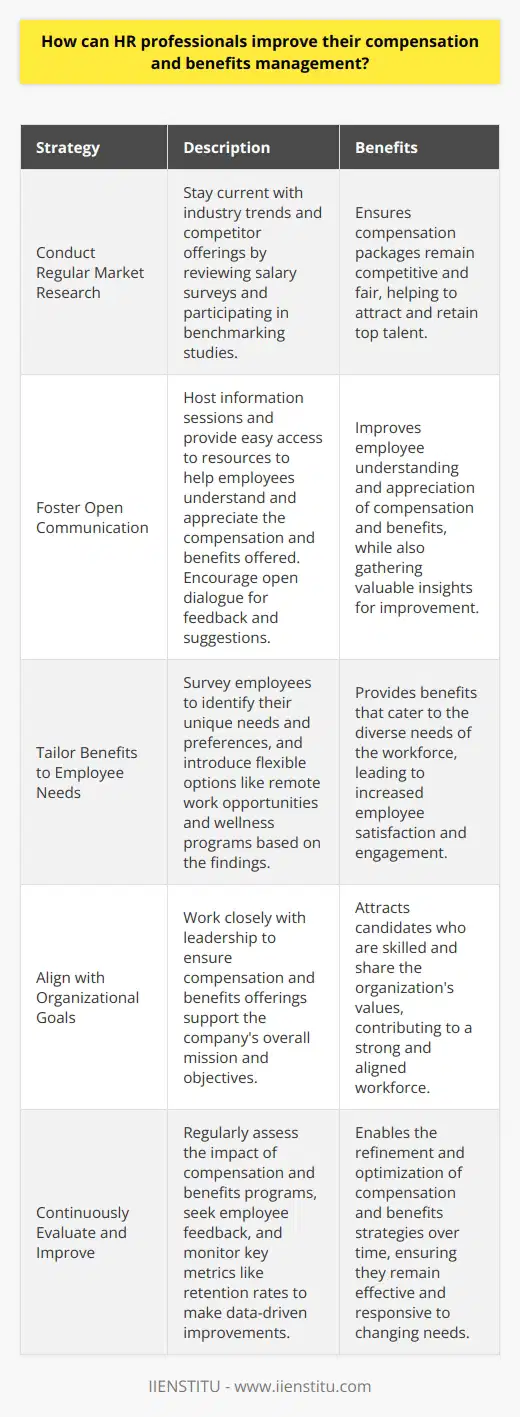
What strategies can HR use to develop their HR technology skills?
As an HR professional, staying up-to-date with the latest HR technology is crucial for success. I've found that a combination of strategies works best for developing these skills.
Attend Conferences and Workshops
One of the most effective ways to learn about new HR tech is by attending industry conferences and workshops. I try to go to at least one or two each year. Not only do you get to see demos of the latest tools, but you also have the opportunity to network with other HR professionals who can share their experiences and insights.
Take Online Courses
Another strategy I've used is taking online courses on HR technology. There are many great options available, from free webinars to more in-depth certification programs. I recently completed a course on data analytics for HR, which has been incredibly helpful in my current role.
Collaborate with IT
Building a strong relationship with your company's IT department can also be beneficial. They can provide valuable guidance on integrating new HR tech into existing systems and processes. I make it a point to meet regularly with our IT team to discuss upcoming projects and get their input.
Experiment with New Tools
Finally, don't be afraid to experiment with new HR tech tools yourself! Many offer free trials or demos that allow you to test them out before committing. I recently tried out a new applicant tracking system and was impressed by its features. It's now on my list of recommendations for our next software upgrade.
Developing your HR technology skills takes time and effort, but it's well worth the investment. By staying curious and proactive, you can position yourself as a valuable asset to any organization.

How can HR professionals enhance their compliance knowledge?
Continuous Learning and Development
As an HR professional, I believe that continuous learning and development is crucial for enhancing compliance knowledge. I make it a point to attend relevant workshops, webinars, and conferences regularly. These events provide valuable insights into the latest compliance trends and best practices. I also find it helpful to engage in online courses and certification programs. They offer a structured learning approach and help me stay updated with the most recent developments in the field.
Networking and Collaboration
In my experience, networking and collaboration with other HR professionals can greatly enhance compliance knowledge. I actively participate in HR forums and discussion groups, both online and offline. These platforms allow me to connect with like-minded individuals, share experiences, and learn from their expertise. I find it particularly beneficial to engage with professionals from different industries and backgrounds. It broadens my perspective and helps me understand compliance issues from various angles.
Staying Updated with Legal and Regulatory Changes
To enhance compliance knowledge, I make it a priority to stay updated with legal and regulatory changes. I regularly review government websites, legal publications, and industry newsletters. I find it helpful to set up alerts and notifications for relevant updates. This ensures that I don't miss any important changes that may impact our organization's compliance practices. I also make it a point to discuss these updates with my team and ensure that our policies and procedures align with the latest regulations.
Practical Application and Case Studies
I believe that practical application and case studies are powerful tools for enhancing compliance knowledge. Whenever I come across a compliance issue or challenge, I take the time to analyze it thoroughly. I research similar cases and study how other organizations have handled them. This helps me gain a deeper understanding of the complexities involved and develop effective strategies for addressing compliance issues in our own organization.
By combining continuous learning, networking, staying updated with legal changes, and practical application, HR professionals can significantly enhance their compliance knowledge. It's an ongoing process that requires dedication and a proactive approach. However, the benefits are well worth the effort. With a strong foundation in compliance, HR professionals can contribute to creating a culture of integrity and mitigating risks within their organizations.
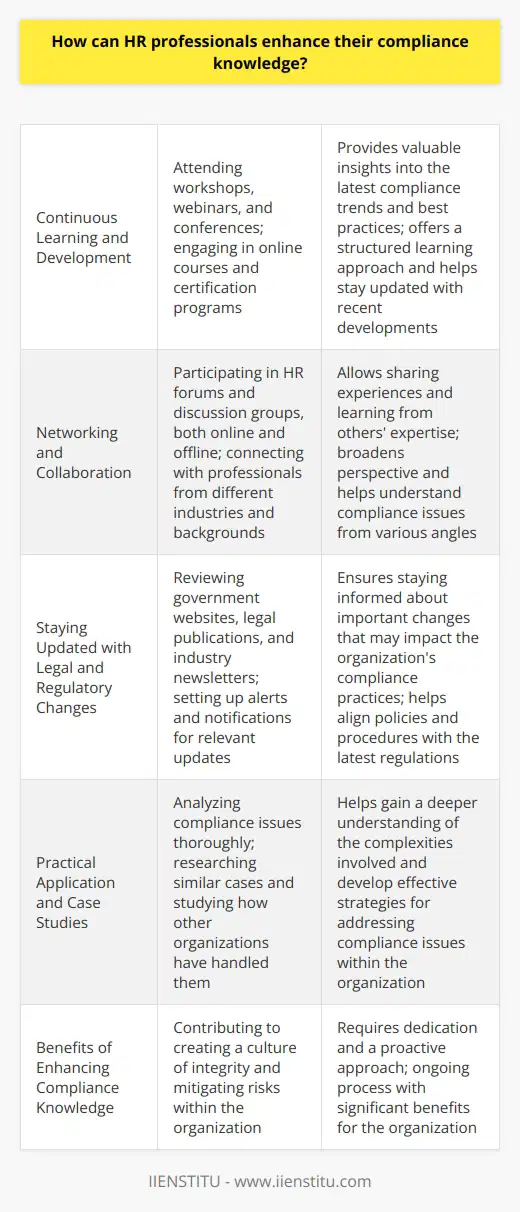
What are some ways to refine employee retention strategies in HR?
As an HR professional, I've found several effective ways to refine employee retention strategies:
Conduct Regular Employee Surveys
I make it a point to survey employees quarterly to gauge their satisfaction and identify areas for improvement. This helps me stay in tune with their needs and address concerns before they escalate.
Offer Competitive Compensation and Benefits
In my experience, offering competitive salaries and a comprehensive benefits package is crucial for retaining top talent. I regularly benchmark our compensation against industry standards to ensure we remain competitive.
Provide Opportunities for Growth and Development
Employees are more likely to stay with a company that invests in their professional development. I work with managers to create individualized development plans for each team member, including training, mentoring, and stretch assignments.
Foster a Positive Work Culture
Creating a positive, supportive work environment is key to employee retention. I strive to model our company values and encourage open communication, recognition, and teamwork.
Implement Flexible Work Arrangements
Offering flexible work options, such as remote work or flexible schedules, can greatly improve employee satisfaction and retention. I've seen firsthand how these arrangements can help employees achieve better work-life balance.
By focusing on these areas, I believe we can significantly improve our employee retention rates and create a more engaged, committed workforce.
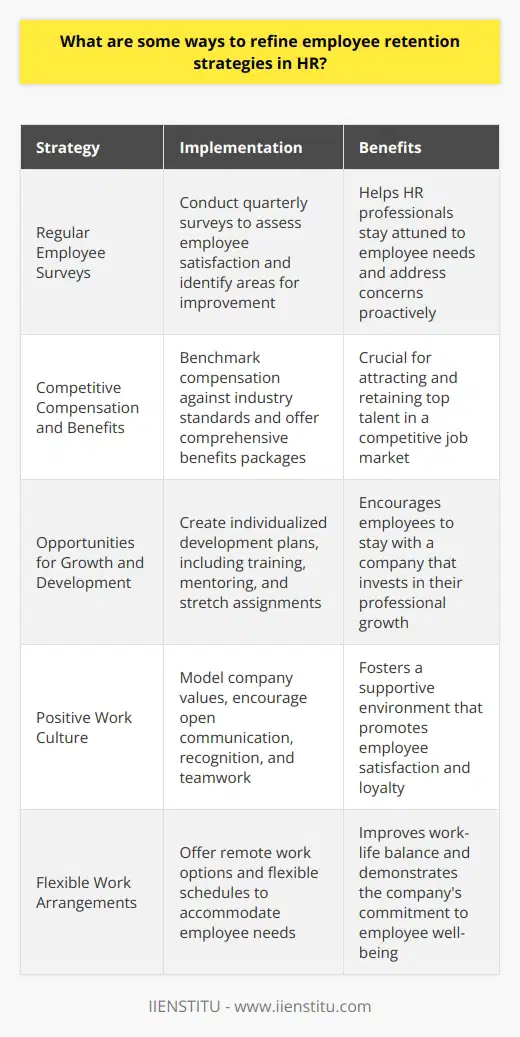
How can HR professionals improve their HR metrics and analytics capabilities?
As an HR professional, I believe that improving HR metrics and analytics capabilities is crucial for making informed decisions and driving business success. Here are some strategies that I've found effective:
Identify Key Metrics
Start by determining the most important HR metrics that align with your company's goals. These might include employee turnover rate, time to fill open positions, and employee engagement scores. Focus on metrics that provide actionable insights.
Invest in the Right Tools
To effectively track and analyze HR data, you need the right tools. Consider investing in HR analytics software or partnering with IT to develop custom solutions. I've seen firsthand how the right tools can streamline data collection and analysis.
Collaborate with Other Departments
HR metrics don't exist in a vacuum. Collaborate with other departments, such as finance and operations, to gain a holistic view of how HR initiatives impact the entire organization. Breaking down silos can lead to valuable insights.
Develop Data Literacy Skills
To make the most of HR analytics, you need to develop data literacy skills. Invest in training for yourself and your team. I've found that attending workshops and conferences can be a great way to stay up-to-date on the latest trends and best practices.
Communicate Insights Effectively
Finally, it's essential to communicate HR insights effectively to key stakeholders. Use data visualization techniques to make complex data easy to understand. When I presented turnover data to our executive team last quarter, using clear visuals helped drive home the importance of our retention initiatives.
By focusing on these strategies, HR professionals can improve their metrics and analytics capabilities and make data-driven decisions that drive business success.
